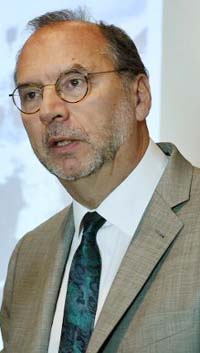
AFP, London :
Europe will be “vulnerable” if it does not regard viruses as a “national security issue” like the United States, the microbiologist who discovered Ebola said in an interview published Friday.
“It’s time the UK and Europe had a well-trained corps of people who are globally experienced and deployable,” Peter Piot told the British daily The Independent.
“We don’t have that and that makes us vulnerable,” said the Belgian scientist, who is director of the School of Hygiene and Tropical Medicine in London.
Piot, who recently returned from a visit to treatment centres in Sierra Leone, praised the Centres for Disease Control in the United States as a “formidable force”.
“We don’t have this ‘epidemic intelligence service’. You don’t want to depend on information coming from the US… That’s a national security issue,” he said.
The paper quoted a response from a spokesman for the British health ministry saying: “The outbreak has shown the need to strengthen global response to epidemics and the UK will play its full part.”
Piot has been highly critical of the delay in local and international responses to the outbreak in west Africa, but said that now “the effort is paying off”.
“There is an opportunity to make sure that this is the last Ebola epidemic where all we have to beat it is quarantine,” he said.
Piot co-discovered the virus in 1976 in what is now the Democratic Republic of the Congo, naming it after a nearby river.
“I couldn’t imagine it would get out of control,” he told The Independent.
The World Health Organization said on Monday that more than 7,500 have died from the Ebola virus in the past year-almost all of them in Guinea, Liberia and Sierra Leone.
Meanwhile, nurses at a public hospital in northern Sierra Leone were on strike Thursday to demand hazard pay for treating Ebola patients, as the region was under lockdown in a bid by authorities to combat the killer virus.
Some 30 nurses at the Mabenteh Hospital in the town of Makeni said they had been refusing to work since Wednesday because of “the non payment of risk allowance” by the government for the month of November.
A spokesman for the nurses, Henry Conteh, told public radio: “We are not going to attend to any patients who are already admitted and will not accept any new cases until we are paid.”
“The matter is serious and needs to be settled urgently,” he said.
There was no immediate information available on how much money the health workers were owed or how many patients had been turned away.
Europe will be “vulnerable” if it does not regard viruses as a “national security issue” like the United States, the microbiologist who discovered Ebola said in an interview published Friday.
“It’s time the UK and Europe had a well-trained corps of people who are globally experienced and deployable,” Peter Piot told the British daily The Independent.
“We don’t have that and that makes us vulnerable,” said the Belgian scientist, who is director of the School of Hygiene and Tropical Medicine in London.
Piot, who recently returned from a visit to treatment centres in Sierra Leone, praised the Centres for Disease Control in the United States as a “formidable force”.
“We don’t have this ‘epidemic intelligence service’. You don’t want to depend on information coming from the US… That’s a national security issue,” he said.
The paper quoted a response from a spokesman for the British health ministry saying: “The outbreak has shown the need to strengthen global response to epidemics and the UK will play its full part.”
Piot has been highly critical of the delay in local and international responses to the outbreak in west Africa, but said that now “the effort is paying off”.
“There is an opportunity to make sure that this is the last Ebola epidemic where all we have to beat it is quarantine,” he said.
Piot co-discovered the virus in 1976 in what is now the Democratic Republic of the Congo, naming it after a nearby river.
“I couldn’t imagine it would get out of control,” he told The Independent.
The World Health Organization said on Monday that more than 7,500 have died from the Ebola virus in the past year-almost all of them in Guinea, Liberia and Sierra Leone.
Meanwhile, nurses at a public hospital in northern Sierra Leone were on strike Thursday to demand hazard pay for treating Ebola patients, as the region was under lockdown in a bid by authorities to combat the killer virus.
Some 30 nurses at the Mabenteh Hospital in the town of Makeni said they had been refusing to work since Wednesday because of “the non payment of risk allowance” by the government for the month of November.
A spokesman for the nurses, Henry Conteh, told public radio: “We are not going to attend to any patients who are already admitted and will not accept any new cases until we are paid.”
“The matter is serious and needs to be settled urgently,” he said.
There was no immediate information available on how much money the health workers were owed or how many patients had been turned away.

